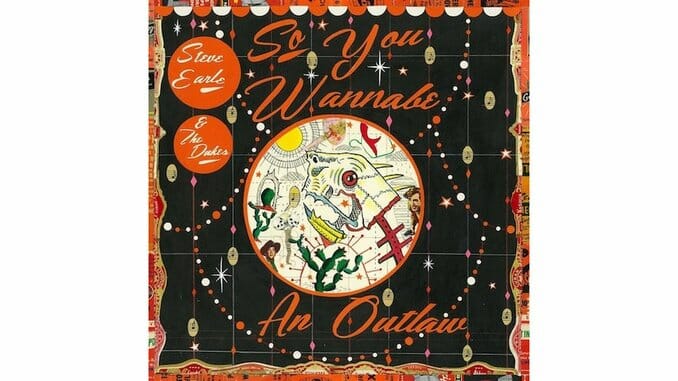
Somewhere in the swagger stagger opening chorus of the cautionary title track of Steve Earle’s return to the majors, the multi-Grammy winner half bellers/half brays “You can never go home…” over and over. With a beat that shuffles and buckles, this lurching kind of honky tonk purveyed by Billy Joe Shaver and celebrated by Waylon Jennings lit the fuse of raw stripped down rock/country roadhouse music that ignited the Outlaw movement. Fiddles reel, steel guitars puddle and electric guitars resonate with the kind of bottom that’d make Beyonce envious. It also reprises Earle’s own twangy opening salvo Guitar Town.
The difference—beyond time and the lack of desperation—is the worn places have grown strong, and the commentary is more about the posturing that attempts to pass for insurrection. Hearing Willie Nelson on the second verse, the authenticity ripples like heat waves on too hot black top. But that blistering realization from a track that at best lopes suggests Keith Richards’ rock and roll swagger actually comes from a state of mind that exists in a descending guitar figure and a back beat that falls with a laid back thump.
Like Waylon Jennings, who came to record “Don’t You Think This Outlaw Bit’s Done Got Out Of Hand” in the wake of Honky Tonk Heroes and the platinum Wanted: The Outlaws compilation, Earle seems to be looking around, weighing the watering down of a movement. Listening to echoes of Townes Van Zandt’s folkie picking (“News From Colorado”), twin-fiddle basted attenuated swing (“Walking In LA”), lurching rock blues (“Fixing To Die”) or exquisite Gruene Hall dance-floor perfection (“You Broke My Heart”), the loose ends of Earle’s signature working man’s post-country offer shrugged off contrast to today’s hollow bluster. More than a reclamation, Outlaw suggests the miles traveled imbue a more fluid application of his roots attack and tattered romanticism.
There’s jangle rock tempering “Sunset Highway,” where the grizzle in Earle’s voice suggests life witness more than the nightstick applied to his throat one New Year’s Eve in Houston too many years ago, while the hushed “The Girl On The Mountain” is a moment of vulnerability from a man strong enough to unleash the churning “Fire Break Line.” All these years in, that subtle tenderness makes Earle more than just another working stiff chafing to get laid or throwing down more tequila.
The haunting “Goodbye Michelangelo” is the jewel. Written for his mentor Guy Clark, it celebrates the eternal circle of creation, life and death. Not only honoring the songwriting icon, Earle evokes “Oh, Susanna” in homage to Clark’s late wife and suggests this is merely another lesson. Crafted to last, “Michelangelo” embodies Clark’s aesthetics with dignity and a nod to our own mortality.